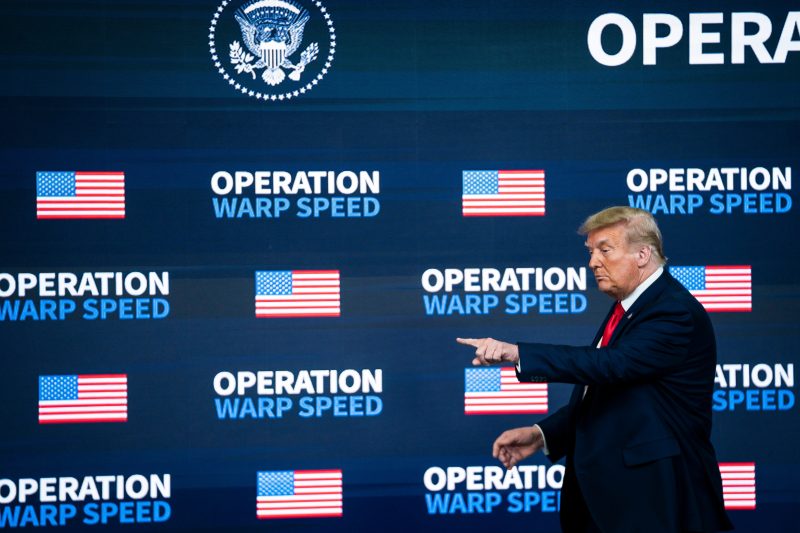
Could anti-vaccine Republicans ditch Trump for Robert F. Kennedy Jr.?
Donald Trump set off a panic in some of the more extreme corners of his base last week during President Biden’s State of the Union.
Trump’s offense? Taking credit for the coronavirus vaccines that Biden hailed.
Alex Jones threatened to go on the “warpath” if Trump kept it up. Michael Flynn agreed with Jones’s plea for Trump to stop. And Charlie Kirk chimed in among his fellow right-wing influencers with a warning of electoral peril for Trump.
The reason for that supposed peril is the independent candidacy of perhaps the country’s most prominent vaccine critic, Robert F. Kennedy Jr. Kennedy hasn’t played up his dubious and false vaccine views too much in his campaign, but he attacked Trump for his comment. Then news broke Tuesday that Kennedy has considered prominent vaccine critic and NFL quarterback Aaron Rodgers for his running mate.
All of which raises a question that has lurked beneath the surface of this campaign: Could Trump’s role in forging the coronavirus vaccines — and his frequent praise for them — send portions of his party’s growing anti-vaccine contingent into Kennedy’s camp?
Kennedy currently polls in the double digits. But despite being much more popular among Republicans than Democrats, he pulls about evenly from the two party’s bases. At this point, theories about how Kennedy’s switch from the Democratic primary to an independent run might hurt Trump (raises hand) haven’t been borne out.
But that doesn’t mean Republicans haven’t been concerned about it. And the concern now seems to be peaking among some Trump allies.
“Do not give RFK any reason to trim at our base, to give people a little uncertainty,” Kirk cautioned Trump, adding that “I would stay away from the vaccine issue.”
Trump has treated the issue gently in recent years. He often criticizes vaccine mandates, but he’s been understandably reluctant to glom on to conspiracy theories about the safety of vaccines that he helped fast-track. And he’s on the record plenty of times vouching for the vaccines and encouraging people to get them.
Florida Gov. Ron DeSantis (R) tried to outflank Trump on vaccines in the primaries, and that obviously didn’t pan out. But that doesn’t mean it couldn’t loom in the general election for a small but significant number of base voters.
The main question is how many Republicans feel strongly enough about this issue.
The Republican base is broadly skeptical of the coronavirus vaccines and has gotten vaccinated at much lower rates than Democrats — apparently contributing to many more covid deaths in Republican-leaning areas.
But not wanting the vaccines is different from being adamantly opposed to them — and potentially opposing politicians who support them.
A few surveys help us drill down a little more.
A September KFF poll showed fully 39 percent of Republicans said they were “not at all confident” that the coronavirus vaccines were safe. And for many of them, this skepticism extended to other vaccines — 19 percent for the RSV vaccine and 15 percent for flu vaccines.
Another survey around the same time showed 27 percent of Republicans said vaccines in general were at least “somewhat” unsafe for children.
Notably, that poll also compared Trump supporters with supporters of other GOP primary candidates. And Trump supporters were actually twice as likely to say the vaccines were unsafe (34 percent to 17 percent).
That suggests Trump has largely locked down most of his party’s strongest vaccine critics. Despite his role in pushing for the vaccines, and however much he’s praised the vaccines, it doesn’t seem to have cost him — at least, to the extent people have actually processed all of that.
But the contrast with DeSantis and other GOP candidates who dipped their toe into vaccine skepticism was somewhat muddled. DeSantis, for instance, had strongly promoted the vaccines early on.
Kennedy presents a more direct contrast, and he seems to be leaning in on this issue a bit more now. To the extent he wants to press this issue and (baselessly) pitch Trump as the father of a dangerous vaccine, it could force portions of Trump’s base into a choice they haven’t faced before.
Maybe the anti-vaccine portion of his base will prove it truly believes in Trump and that the details are fungible, as it has on so many other issues.
But it’s rare you see Trump booed at his own rally, as he was when he brought up the vaccines in 2021. And last summer, Trump seemed to recognize how problematic this issue could be for him.
“I really don’t want to talk about it,” Trump told Fox News, “because, as a Republican, it’s not a great thing to talk about, because for some reason it’s just not.”
That might be less of an option in a race against Kennedy.
